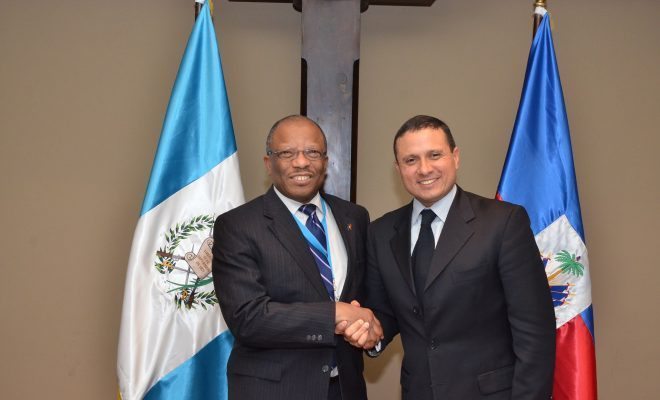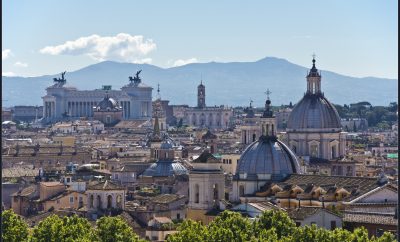 Image courtesy of [MINEX GUATEMALA via Flickr]
Image courtesy of [MINEX GUATEMALA via Flickr]
World
Guatemalan Elections: How a Comedian Became President
On October 26, Jimmy Morales defeated former first lady Sandra Torres in a runoff election, taking 67.4 percent of the vote to become Guatemala’s president-elect. Scheduled to take office in 2016, little is known about Morales’ plan for his government other than that he is a conservative who believes in minimal government interference.
The general election was held as scheduled despite the resignation of President Otto Perez Molina a few days before after he was indicted on corruption charges that had claimed his prior vice-president and numerous members of his cabinet.
Despite the fact that he lacks any former political experience aside from a failed mayoral run in 2011, read on to understand the making of Morales’ rise to the presidency.
The Guatemalan Civil War (1960-1996) and Aftermath
In order to understand Guatemala’s recent election, it’s crucial to first discuss the country’s history of conflict and the connection to its recent corruption challenges. During the 1940s and early 1950s, elections in Guatemala brought popular, leftist leaders into power. In 1954, a United States-backed coup, headed by Carlos Castillo Armas, brought a military regime to power. In the 1960s, conflict between left-wing guerrilla groups and the military sparked a civil war that lasted for decades. In the 1970s, military rulers began a campaign to eliminate guerrilla leaders, causing approximately 50,000 deaths. Numerous atrocities, including genocide and forced disappearances, were committed largely by government forces. The state-sponsored atrocities killed an estimated 200,000 civilians during the nation’s civil war.
Despite the signing of peace accords in 1996, Guatemala continues to face issues like extreme poverty, illiteracy, and racism against indigenous peoples. Political tension has remained a constant, as shown by the recent turbulent election of a television comedian to the office of president. Numerous ex-government officials and landowners who assisted paramilitary groups have been convicted for their roles in the atrocities during the civil war. The internal debate over whether acts of genocide were actually committed continues, and was disputed by former president Molina.
The Road to Morales (1996-2015)
As suggested above, the transition period from civil war to peacetime democracy was slow and rocky and may still be underway. In late the 1990s and early 2000s, the government focused on cracking down on crime and protecting the human rights of civilians victimized by the past wartime governments. However, the post-war government was challenged with high crime rates, corruption, and violence directed at human rights groups and journalists.
Efrain Rios Montt, a former military leader, was permitted to run for president in 2003 despite a constitutional rule that prevented anyone who had attempted to overthrow the government from running for election. Montt had become the national leader in 1982 following a coup and oversaw the escalation of violence in the countryside. He lost the 2003 election to Oscar Berger, who later allowed the United Nations to help create the International Commission against Impunity in Guatemala (CICIG). The group was tasked with assisting national law enforcement prosecute organized crime and drug trafficking.
Otto Perez Molina was elected president in 2011, a position that he held until earlier this year. In April, the CICIG released a report implicating numerous members of Molina’s government of corruption, most notably Vice-President Roxana Baldetti. The scandal, which became known as La Linea, revolved around officials taking bribes from importers in exchange for tariff reductions. The tactic dates back to the civil war, when military officials used payoffs finance their counter-insurgency operations. In a protest that was largely organized through social media, tens of thousands of people came out in the streets of the capital urging Baldetti to resign. After a few days, she complied.
Since Baldetti’s resignation, the corruption case has claimed more than 20 government officials, including members of opposition parties. On August 21, the CICIG issued a report which presented further evidence putting former Vice-President Baldetti and President Molina at the head of the La Linea operation. Guatemalans once again took to the streets, demanding Molina’s resignation. On September 1, the Guatemalan congress voted unanimously to withdraw the president’s protection from prosecution and two days later, Molina resigned and was arrested. On September 7, the general election was held with Morales the clear favorite heading into the runoff.
The election was held despite concerns that the La Linea scandal polluted the lead-up to the election with accusations against the candidates. Others insisted that the election should go ahead to avoid a power vacuum.
Jimmy Morales and the Election
With the slogan “Neither corrupt, nor a thief” and waning voter enthusiasm, Morales won the election. Nearly half of Guatemala’s 7.5 million registered voters did not cast ballots. Of those who did, many cited a lack of satisfaction with the current government and low expectations for any future regime. Morales’s victory is likely due to the fact that he is a political outsider who could present a contrast to the officials claimed by the La Linea scandal. He had 13 opponents in the general election but won with a plurality of the vote. Because neither of the three leading candidates met the 50 percent threshold, a runoff election was held shortly after the general. Morales’ won the runoff with around 68 percent of all votes cast.
Manuel Baldizon was considered the front-runner in the election as recently as April, but his association with the established government hurt his campaign after the scandal came to light. He finished in third place in the general election but quit the race prior to the runoff election leaving Morales and Sandra Torrez as the two remaining options.
Morales’s dominant victory in the runoff has been viewed as a rejection of the status quo by voters. However, it must be noted that Morales’s party, the National Convergence Front (FCN) only claimed 11 of the 158 available seats in Congress. Despite his landslide victory, he now faces an uphill battle as he will need to establish a coalition in the among legislators in order to advance his policy agenda.
What to Expect
Although Jimmy Morales was elected with around 68 percent of the vote, his campaign did not offer many specifics about his plans for the country. As BBC notes, his campaign manifesto is just six pages long and contains few details about policy positions beyond fighting corruption.
His campaign website emphasizes his interest in strengthening three areas: employment, education, and public health. His political ideology appears to be strongly influenced by Reaganism and a desire for minimal government interference–in fact, the “about” section of his website features a long quote from Ronald Reagan.
Expectations heading into Morales’s presidency are low given the lack of support he’ll have in Congress on day one. While his specific policy positions remain unclear, reports highlight his emphasis on religion and small government. He has stated his opposition to abortion, same-sex marriage, and the legalization of recreational drugs. Women’s rights and gay rights groups have come out against of Morales for his views, and his controversial characters in a popular sketch comedy show raised questions about his position on social issues.
Another notable area of concern is his Party’s ties to military leaders during the civil war, whom many associate with violence and corruption. In response to criticism, Morales defended his Party by issuing a clarification on his website, which noted that much of the Party leadership was replaced when he joined in 2013.
Morales has said that will not be able to make Guatemala’s economic and government problems disappear on his own. While he touted his inexperience and background to win an election that claimed many old guard politicians as victims, those virtues may now act as limitations as he attempts to build a governing coalition.
In the meantime, interim President Alejandro Maldonado has voiced support for the protesters and has backed the charges against former President Molina. Maldonado hopes that the recent developments will help the country deal with its corruption issues as it transitions to a new government. He will serve as the interim President until Morales takes office in January.
Conclusion
On the surface, the results of the Guatemalan election may appear curious, but the reality is that the election of former comedian Jimmy Morales is the result of deeply seeded distrust in the political system. Despite his background in comedy, Morales hails from a conservative party with ties to controversial leaders during the civil war. While he has not given many specifics about what his presidency will look like, it is clear that Guatemalans chose him as an alternative to the status quo. Yet, despite his landslide victory on election day, voter turnout was particularly low, indicating a general dissatisfaction with the current system.
The people of Guatemala are desperate for any form of change, rejecting established political elites for an inexperienced but popular comedian. The populace remains split between those who a cynical of any Guatemalan government and those that remain cautiously optimistic for real change.
Resources
Primary
United Nations: International Commission Against Impunity in Guatemala
Additional
The Washington Post: The ‘Donald Trump of Guatemala’ was just Elected President
The Washington Post: Guatemalan President Resigns After Judge Orders Him to Face Corruption Charges
Reuters: No joke: Guatemalan Comedian Wins Presidency in Landslide
BBC: Guatemala election: Jimmy Morales Elected President
New York Times: Jimmy Morales is Elected New President in Guatemala
CNN: Guatemala election: Presidential Runoff set for October; Comedian is Frontrunner
LA Times: Guatemala Presidential Candidate Quits Party, Drops Out of Race
Victoria Sanford: Victory in Guatemala? Not Yet
Jimmy Morales: Campaign Website
Regina Bateson: How Local Institutions Emerge from Civil War
Vox: Guatemala’s Crisis, Explained: Why the President Just Resigned
John Oliver: Guatemala’s Election
Al Jazeera: Talk to Al Jazeera: Showdown in Guatemala: Ending an Era of Impunity?
Journeyman Pictures: An American Genocide: Guatemala








Comments